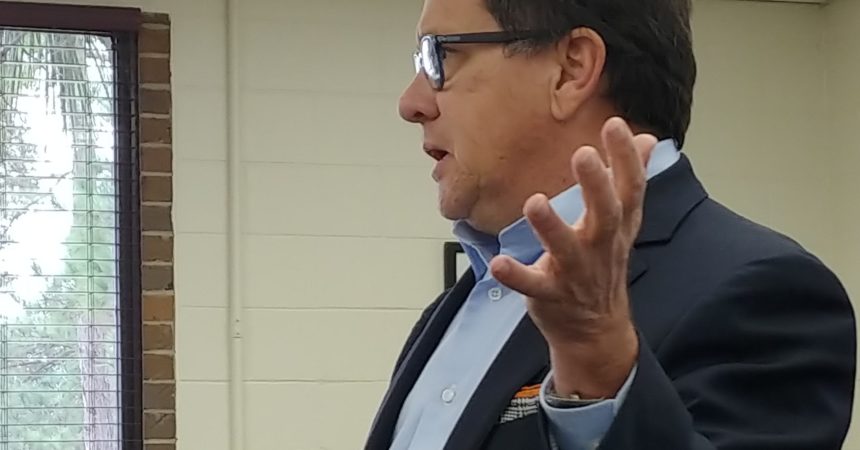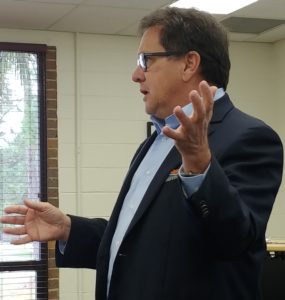
Mass commutation not likely in Florida … now
By St. Clair Murraine
Outlook staff writer
Florida’s prisoner system most likely won’t see a mass commutation like what recently took place in Oklahoma, although there is hope that such a reprieve might not be too far off for some who commit low-level crimes in the state.
Attorney Reggie Garcia, who has spent more than two decades handling cases involving some level of pardon, is among the optimistic. That much came across when he spoke to an audience at Lively Technical College about the forms of early release during a Ready4Work reentry symposium last Thursday.

Attorney Reggie Garcia explains the ways that felons could be pardoned at a Ready4Work symposium last week at Lively Technical College.
Photo by St. Clair Murraine
“I think that the governor and the cabinet will say at some point the backlog takes too long; we have too many people in state prison they don’t need to be in prison and hopefully they would look at potential commutations as a block,” Garcia said. “Do I have any inside information? No. That may be me just wishfully thinking. You’ve got three very, very strong conservatives on the cabinet and one Democrat is a lawyer but all I think are second-chance people and fair-minded people.”
There are 96,000 inmates in facilities run by the state’s Department of Corrections, which operates on a $2.7 billion budget.
Yet, the Florida prison system isn’t near what Oklahoma has become to get the ranking of being the state with the most incarcerated in the country. Its recent commutation of 527 prisoners in one day reduces incarceration by 1.7 percent.
The mass commutation in Oklahoma is the result of two questions that voters approved in 2016. Keith Parker, coordinator of the symposium who teaches sociology and criminal justice at FAMU, suggest that a ballot measure might help to make mass commutation possible in Florida.
“If there is a concern by the citizens of the state about certain low-level, non-violent crimes being over criminalized and the punishment being too severe,” said Parker, “we can communicate with our elected official, bring to their attention the disparities between crime and punishment and get them to maybe put in place statutes for early release commutations for non-violent crimes.”
In Florida, the process of getting any kind of pardon for early release is time consuming. Garcia addressed executive clemency, parole, work release and conditional medical release during his 30-minute presentation.
Of all of the ways to get early release, executive clemency is primarily the duty of the governor and members of his cabinet. Gov. Ron DeSantis is yet to oversee one of those cases and it’s unclear if his stance will be like his predecessor Rick Scott. The former governor only granted clemency to five people during his eight years in office.
Executive clemency usually is a last-ditch effort by a prisoner to get their time reduced.
“When appeals have been exhausted, that’s about all that’s left,” Garcia said.
Work release is one of the most popular ways that felons have their incarceration reduced. There are 35 work release centers in the state and about 4,000 slots, Garcia said.
Surprisingly an estimated 4,500 prisoners could have their sentences commuted by parole, although state law abolished the system in 1995.
However, prisoners who were incarcerated before 1995 could still have their cases heard before the parole commission.
Garcia encouraged his listeners to get a first-hand look at the parole process.
“If you want to see a fascinating social science experiment go out to the parole commission’s offices,” he said. “Almost every Wednesday of the month out at Southwood they meet in one of the Public Service Commission conference rooms. You will see the lawyers, family members on behalf of the inmates. Unlike television, the inmate is not at the parole hearing.”
During his presentation, it was clear that Garcia is an advocate for conditional medical release. He pointed out that many of the likely candidates for a medical release are at Zephyrhills Correctional Institute, which has a population of 750 and most of them being over 50 years old.
Terminally ill or incapacitated prisons are the most likely to be eligible for a conditional medical release, Garcia said.
“It would save money if our oldest and sickest had some way to get out,” Garcia said.
Prior to Garcia’s presentation, several Ready4Work clients shared their experience of making a reentry. City commissioner Curtis Richardson praised the work being done by Ready4Work, especially for giving its clients the tools for reentry.
“We know that those people who are released will be coming back to our communities,” Richardson said. “Sixty percent of those that are released will be coming back to Leon County and if they aren’t prepared to reenter society in a productive way then they resort to what they were doing that caused them to go to prison in the first place. So we have to provide the resources that they need in order to conduct a successful reentry.”
Ironically, the symposium took place on date that Ready4Work started in 2016. Each year, the symposium has brought together criminal justice and several professionals for the day-long event.
“We want people that are part of the criminal justice system to know that there are programs in place to offer them another opportunity to make changes in their lives,” said Lucretia Collins, director of Ready4Work. “Our program is created solely to assist them in that transformation and make them aware that there is always a second chance.
“Most of them get out not knowing how they’re going to survive, not knowing where they’re going stay, not knowing where their next meal is coming from. We try to provide them with that kind of service, including helping them to recondition their minds to realize they have to change their thought process in order to find the kinds of jobs to take care of themselves and their families.”







